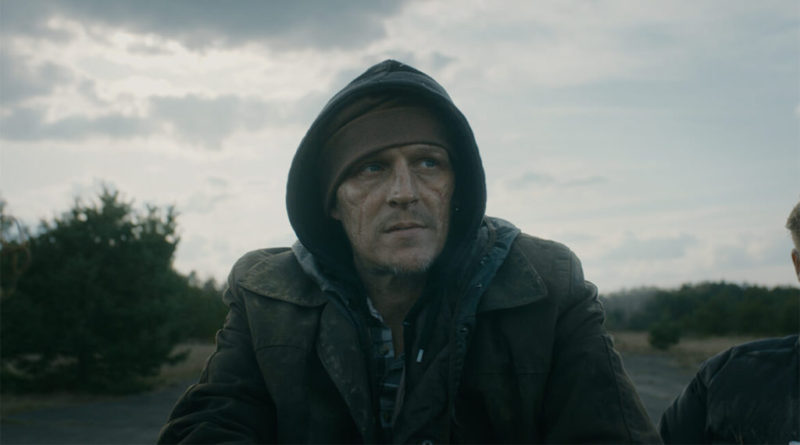Written and directed by Leonel Dietsche (3000 2015), The New End is a post-apocalyptic fairy tale, full of knights, kings, jesters, and magicians rotted beyond recognition in radioactive dust. But in this decaying kingdom, there’s only one fair maiden left. The moral of this story, eulogized in the simultaneously hopeful and hopeless final line, is that men destroy beauty… most often in the form of fair maidens.
Judging any movie by an imaginary scoreboard, deducting points as necessary for each problematic plot point, only does the artistic sum a disservice. However, at its bitter, brutal core, The New End is about men abusing the young woman they respectively love, long for, and lust after.

The sexual violence is mostly hinted at and cut away from just before it turns into outright exploitation. The near-mute Daughter (Milena Tscharntke: Isy Way Out 2018) is dragged into a basement by a ragtag company of soldiers and bent over a barrel. The next time we see her several scenes later, she’s cowering in the corner of the same room, almost indistinguishable from the surrounding ruin.
The drugged-out and debauched Doctor, played with unflinching conviction by Sylvester Growth (Inglourious Basterds 2009), inspects her naked body and, after forcibly taking her as his bride, rapes her. The effect is never shown, only his clinical confusion followed by his desperate sweat. It’s still queasy enough to warn off the unwary, even if The New End does more telling than showing.

The lens of the story is admittedly male. Dietsche recounts everything through the Dwarf, a lonely scavenger who spends his days being mocked by the powerful and watching the Daughter find solitary peace in the woods. Even with his snooping and mistakes, he’s about the only guileless soul in the bunch, thanks in no small part to the physical performance of Mick Morris Mehnert (Acid Soda 2017) and the VO of Louis Hoffman (Dark TV series 2017). The New End is his story, told from his fringe perspective as the tolerated amusement of the Warlord (Marko Mandic: The Hitman’s Bodyguard 2017). Those layers of detachment, both his as a bystander and ours as his audience, robs the Daughter of much weight beyond motivation for her admirers.
Therein hides the frustration of The New End. It’s an arresting world. Cinematographer Roland Stuprich (The Council of Birds 2014) renders a natural, almost regal land out of the crumbling leftovers. Burned out apartment complexes still stand like brick-and-mortar Pantheons. The Doctor’s estate wouldn’t be out of place in most rural outskirts, but here, it’s nothing short of a fortress. The synth score from Antimo Sorgente (The Bittersweet Taste of Power 2015) is deceptively simple, eventually tapping into the subliminal unease of production company logos on old VHS tapes. Even the logline: “After an unspecificed Screwfly apocalypse, one of the last women on Earth must risk revealing her existence to save her dying mother,” is promising. But the last thing on its mind is a narrative.

Notice how the characters don’t have names. Dwarf. Doctor. Daughter. Warlord. It’s storybook shorthand for the end of the world. An end of the world, once removed of enough specificity, can tip dangerously toward the familiar. Without a hook or even a designated hero to keep it moving, The New End devolves into a montage of ugly textures. Scarred survivors. Bruised knees. Stripped escalators descending forever into their reflections on stagnant water. It’s a pretty hell, but even with a brisk runtime just over an hour, a restlessness creeps in.

Befitting Dietsche’s background as a documentarian, The New End plays best as a window into the other side of Armageddon. There’s more conflict than plot, more archetypes than characters. As a future fable, it fits together like an improvised bedtime story – not exactly incoherent, but a little too loose and awfully familiar, with a lesson you’ve probably heard better before. The New End suggests the world is better off without men, but never quite justifies destroying the last woman alive to prove it.
 PopHorror Let's Get Scared
PopHorror Let's Get Scared




